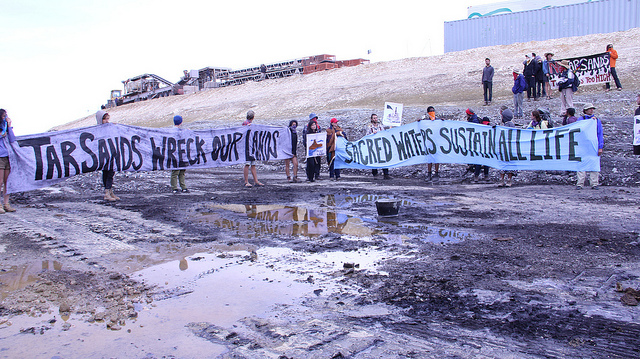
The debate over the Keystone XL pipeline has launched Canadian tar sands into mainstream American discourse, but few people seem to know that a tar sands mine is now being constructed in the United States. The project is being managed by former Halliburton subsidiary Kellogg Brown and Root.
The mine will be excavated in PR Spring, a remote piece of wilderness on the Tavaputs Plateau in eastern Utah. Facing northeast from Arches National Park, 109 miles away, one can see the plateau stretching along the horizon. The mine will sit just above the spring that the area is named for; a BLM-managed campground is nearby.
The area is part of the Colorado River watershed, which supplies water to more than 30 million people. The land is owned by US Oil Sands, Inc., a Calgary-based company with a 100 percent interest in 32,005 acres of Utah tar sands leases. According to the company’s website, their leases comprise the largest commercial tar sands stake in the United States.
The company boasts of its “unique and environmentally friendly extraction process,” which uses a citrus-based solvent called d-Limonene to separate oil from the rest of the material brought up in extraction. But a 2012 report by InsideClimate News questioned the safety of the technique, noting that while the FDA lists small amounts as generally safe, “in large doses, laboratory rats got sick when exposed to the chemical.”
On January 20, 2014, US Oil Sands announced in a press release that it had selected engineering firm Kellogg Brown and Root to manage the construction of the tar sands mine and facilities at PR Spring. KBR is a former subsidiary of Halliburton, a private military contractor specializing in oilfield services that has been the subject of controversy for its ties to Dick Cheney, who served as the corporation’s CEO before becoming vice president of the United States, and for its role in the 2010 Deepwater Horizon oil spill.
KBR is not without its own controversies. In March 2008, The Boston Globe reported that the company “avoided paying hundreds of millions of dollars in federal Medicare and Social Security taxes by hiring workers through shell companies” based in the Cayman Islands.
In 2009, an investigation by the US Department of Justice led to charges that KBR had spent the past decade “authorizing, promising and paying” bribes to Nigerian officials to secure prime construction contracts. The company pled guilty and paid a $402 million criminal fine.
When it comes to environmental and health matters, of most concern is KBR’s alleged use of “burn pits” to improperly dispose of waste in Iraq and Afghanistan. In 2010, 57 burn-pit lawsuits filed by soldiers across the United States were consolidated and brought before the US District Court in Maryland.
According to the website of Motley Rice, the law firm representing the plaintiffs in tandem with attorney Susan Burke, the lawsuit alleges that health problems suffered by the plaintiffs upon their return to the United States are due to their exposure to burn pits operated by KBR. “Plaintiffs also allege these contractors used open-air burn pits, as opposed to other, safer alternatives, to increase profits,” Motley Rice said on its website. “Items disposed of in burn pits may have included hazardous medical waste, hydraulic fluids, lithium batteries, tires, trucks and more.”
After the district court dismissed the case in February 2013, Motley Rice appealed. The US Court of Appeals for the Fourth Circuit voided the dismissal in March 2014 and sent the case back to the district court for a retrial.
KBR’s construction quality has also been called into question. Soldiers in Iraq and Afghanistan have been electrocuted by faulty wiring installed by KBR. According to an investigation by The New York Times, KBR’s management did nothing to rectify the issue, despite complaints from multiple employees. One employee, the Times said, “provided e-mail messages and other documents showing that he had complained to KBR and the government that logs were created to make it appear that nonexistent electrical safety systems were properly functioning.”
For Utah, the effect of KBR’s participation in mine construction remains to be seen. According to the Project On Government Oversight, a watchdog group that tracks and investigates government misconduct, the firm has committed 30 known instances of corporate misconduct both domestically and internationally in the past 18 years.
Given this track record, why did US Oil Sands select KBR to build the mine? In an email, Jack Copping, manager of corporate development at US Oil Sands, said only that “KBR was chosen through a bidding process based on the expertise of the local Salt Lake branch and the pedigree of the individuals involved.”
When asked how important KBR’s history of questionable practices were to US Oil Sands’ decision-making process and ultimate choice, Copping did not respond.
US Oil Sands has been engaged in preliminary construction of the mine throughout 2014. On November 18, 2014, the company issued a press release saying the mine is on track to begin commercial production of tar sands in 2015. Environmental advocacy groups in Utah have been fighting the mine’s development since 2009; though litigation and civil disobedience have not stopped the project, groups such as Utah Tar Sands Resistance continue to actively protest the mine’s construction.
Join us in defending the truth before it’s too late
The future of independent journalism is uncertain, and the consequences of losing it are too grave to ignore. To ensure Truthout remains safe, strong, and free, we need to raise $43,000 in the next 6 days. Every dollar raised goes directly toward the costs of producing news you can trust.
Please give what you can — because by supporting us with a tax-deductible donation, you’re not just preserving a source of news, you’re helping to safeguard what’s left of our democracy.